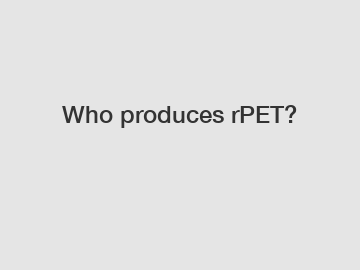Who produces rPET?
Who produces rPET?
In recent years, there has been a growing concern about the environmental impact of plastic waste, particularly single-use plastics. This concern has led to a rise in the popularity of recycling, with one particular type of recycled plastic gaining attention - rPET, or recycled polyethylene terephthalate. But who is responsible for producing rPET and ensuring its availability in the market?
rPET is produced by various stakeholders in the recycling industry, including recycling facilities, bottle manufacturers, and even major beverage companies. Let's take a closer look at each of these players and their roles in the production of rPET.

Recycling Facilities:
At the heart of rPET production are recycling facilities. These facilities collect and sort different types of plastic waste, including PET bottles and containers. Through a complex process involving sorting, cleaning, and shredding, the collected plastic is transformed into PET flakes. These flakes are then sent to be further processed into rPET.
In recent years, there has been a significant investment in recycling facilities worldwide, aiming to increase their capacity and efficiency. This investment has been driven by both environmental concerns and the growing demand for rPET as an alternative to virgin plastic.
Bottle Manufacturers:
Once the PET flakes reach the manufacturing stage, bottle manufacturers play a crucial role in the production of rPET. These manufacturers use the PET flakes as the raw material to create new bottles and containers. The flakes are melted and shaped into preforms, which are then blown into the final bottle shape. This process significantly reduces the need for new plastics, conserving valuable resources.
Many bottle manufacturers have embraced rPET as part of their sustainability initiatives. By incorporating recycled content into their products, they contribute to the circular economy, where materials are continuously reused instead of being discarded.
Beverage Companies:
It is not only recycling facilities and bottle manufacturers that contribute to rPET production; major beverage companies also play a part. Some of the largest players in the industry have made commitments to incorporate more recycled content into their packaging. This commitment helps drive the demand for rPET and provides a market for the recycled material.
Furthermore, some beverage companies have established partnerships with recycling facilities and bottle manufacturers to create closed-loop systems. In these systems, the companies collect and recycle their own plastic bottles, ensuring a consistent supply of rPET for their packaging needs.
Closing Paragraph:
In conclusion, the production of rPET involves various stakeholders working together to transform plastic waste into a valuable resource. Recycling facilities collect and process plastic waste into PET flakes, which are then used by bottle manufacturers to create new products. Additionally, major beverage companies are increasingly incorporating rPET into their packaging, driving the demand for this recycled material. The combined efforts of these stakeholders contribute to reducing plastic waste and promoting a more sustainable future. If you have any further questions about rPET or want to get involved in recycling initiatives, please do not hesitate to contact us.
Are you interested in learning more about rPET pellets, rPET pellets, rPET pellets? Contact us today to secure an expert consultation!

Comments